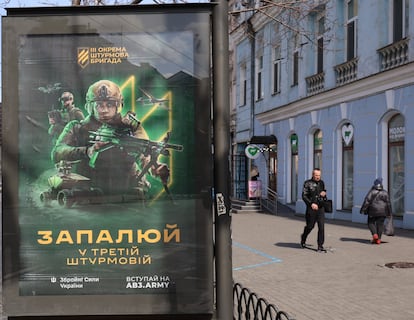Salaries, benefits and promotions: Ukraine’s army brigades compete to recruit soldiers
On the streets and on social media, dozens of military units are using advertising campaigns to attract citizens who are willing to enlist, instead of waiting to be forced by law
Last Tuesday, four soldiers walked around the Palace of Sports in Kyiv, carrying folders in their hands. This was a recruiting patrol, one of the most unpopular jobs in Ukraine. Its function is to identify men who haven’t complied with the obligation to register at the city’s military offices, or those who have ignored the Army’s call to join its ranks. In front of the Palace of Sports, there’s a huge screen that projects advertisements. One of the ads features images of soldiers, which are interspersed with slogans and a telephone number: “Fight and don’t flee. Join the 5th Separate Assault Brigade.”
Kyiv — like the rest of Ukraine — is filled with advertisements aimed at adults over 18 years of age who are willing to enlist. Each brigade, and even the battalions of these brigades, can hire soldiers independently. EL PAÍS found posters on public roads from eight different military units in just a two-hour-long tour of the Pechersk district, in the center of the capital. Each message shows the emblem of the respective unit that’s doing the recruiting, a QR code to consult job offers, or a telephone number to request information “anonymously.” The Jartia Brigade of the National Guard emphasizes this anonymity in its advertisements, to assure citizens who are avoiding the draft law that they won’t be reported should they phone in.

Advertising of this nature has existed since the start of the Russian invasion, in February 2022. However, the amount of ads has skyrocketed, coinciding with increasing pressure from recruiting offices. Valerii Zaluzhnyi, the former commander-in-chief of the Armed Forces of Ukraine, said this past January that up to 500,000 new soldiers are needed. Rotating troops is essential after more than two years of conflict (almost 900,000 people have served in the country’s defense) and the Ukrainian Parliament is finalizing a new law that toughens methods to accelerate mobilization.
The logic behind the advertising put up by these military units is that, if you volunteer, you have more options to choose where you’ll serve and in what capacity. “Being a volunteer means being free, because you choose your destiny. It’s an honor; you don’t wait for the state to decide for you,” says the Achilles Battalion, of the 92nd Assault Brigade.
The government is insisting on this logic to convince recruits. The sooner a person presents themselves and fulfills their responsibility to the country, the more options they have when it comes to choosing the functions they wish to perform in the military. Dozens of battalions in need of replacements are competing to attract new personnel. They have a variety of positions to fill, such as gunner, mechanic, drone operator, combat engineer, cook, doctor, or telecommunications expert.
The units with superior weapons and better preparation highlight these conditions in their job offers, guaranteeing two months of training (in some cases in NATO countries). It’s not a minor issue: throughout the war, there’s been much criticism about the poor training that certain troops receive when they are sent to the frontlines. “The safety of our people is the priority,” the Da Vinci Wolves Battalion affirms. This is a famous unit that belongs to the 67th Mechanized Brigade. “None of our soldiers enter service until they are 100% prepared for their role. Everyone goes through training provided by the best instructors from leading armies.”
The Da Vinci Wolves also highlight that they have an attractive social benefits package: “Salary, vacations, health insurance, etc. In addition, each combatant receives the necessary equipment.” There are repeated, widespread complaints that the troops — regardless of the unit — don’t get enough leave and that many of their materials must be purchased out of pocket.
Social benefits
Lobby X is an online platform for job offers in the Armed Forces of Ukraine. At the moment, its advertising campaign is the most prominent in the country, while its database includes hundreds of specific positions being offered by brigades, special forces and the security services. The classified ads are precise in the requirements and advantages of each position. Salaries range between 500 and 3,200 euros per month ($540 to $3,500) depending on the complexity of the work (the best salaries are in the Special Operations Forces) and, above all, the location: the closer to the front, the more money.
Perks beyond salary also make a difference. For instance, the 128th Mountain Assault Brigade offers a state-provided loan for the purchase of housing for military personnel. An advertisement from this brigade to fill the position of firefighter includes medical insurance, annual financing for rehabilitation programs in case of being injured, training in Ukraine and abroad, as well as all necessary materials to effectively perform the job’s functions.
Military recruitment is based on optimistic marketing. The reason for this is that the vast majority of civilians simply don’t want to join the ranks. Hundreds of thousands of Ukrainian men are hiding from the legal obligation to report to Army offices. On March 12, a revealing figure was provided by the Kyiv-based Center for Economic Strategy: the number of Ukrainian men abroad has doubled. If in November 2022 adult men represented 17% of refugees, they now make up 35%. The majority have allegedly left the country illegally.
The problem is that the Ukrainians don’t see that the war can be won, nor that the conflict will end soon. “Why is it so difficult to convince civilians to be mobilized?” Mikola Bielieskov — an analyst at the National Institute for Strategic Studies (an organization dependent on the Ukrainian presidency) — asked rhetorically on March 22 at the Kyiv Security Forum. His response was pessimistic: “Because they see that there are no resources to fight, and, if there’s no desire to fight, there will be fewer supplies” of weapons and aid from Ukraine’s allies.
Sign up for our weekly newsletter to get more English-language news coverage from EL PAÍS USA Edition
Tu suscripción se está usando en otro dispositivo
¿Quieres añadir otro usuario a tu suscripción?
Si continúas leyendo en este dispositivo, no se podrá leer en el otro.
FlechaTu suscripción se está usando en otro dispositivo y solo puedes acceder a EL PAÍS desde un dispositivo a la vez.
Si quieres compartir tu cuenta, cambia tu suscripción a la modalidad Premium, así podrás añadir otro usuario. Cada uno accederá con su propia cuenta de email, lo que os permitirá personalizar vuestra experiencia en EL PAÍS.
¿Tienes una suscripción de empresa? Accede aquí para contratar más cuentas.
En el caso de no saber quién está usando tu cuenta, te recomendamos cambiar tu contraseña aquí.
Si decides continuar compartiendo tu cuenta, este mensaje se mostrará en tu dispositivo y en el de la otra persona que está usando tu cuenta de forma indefinida, afectando a tu experiencia de lectura. Puedes consultar aquí los términos y condiciones de la suscripción digital.









































